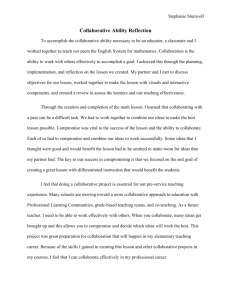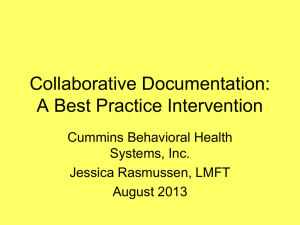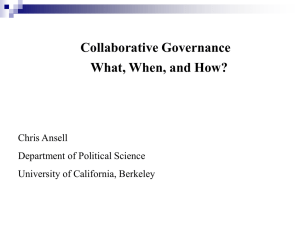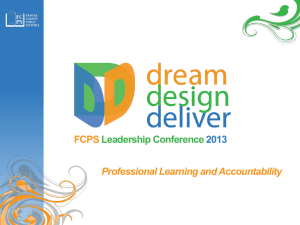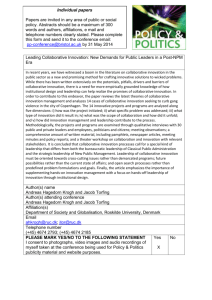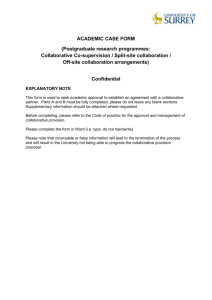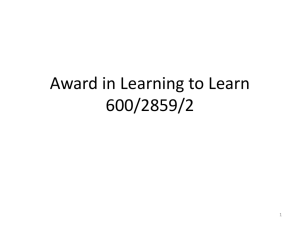sample syllabus
advertisement
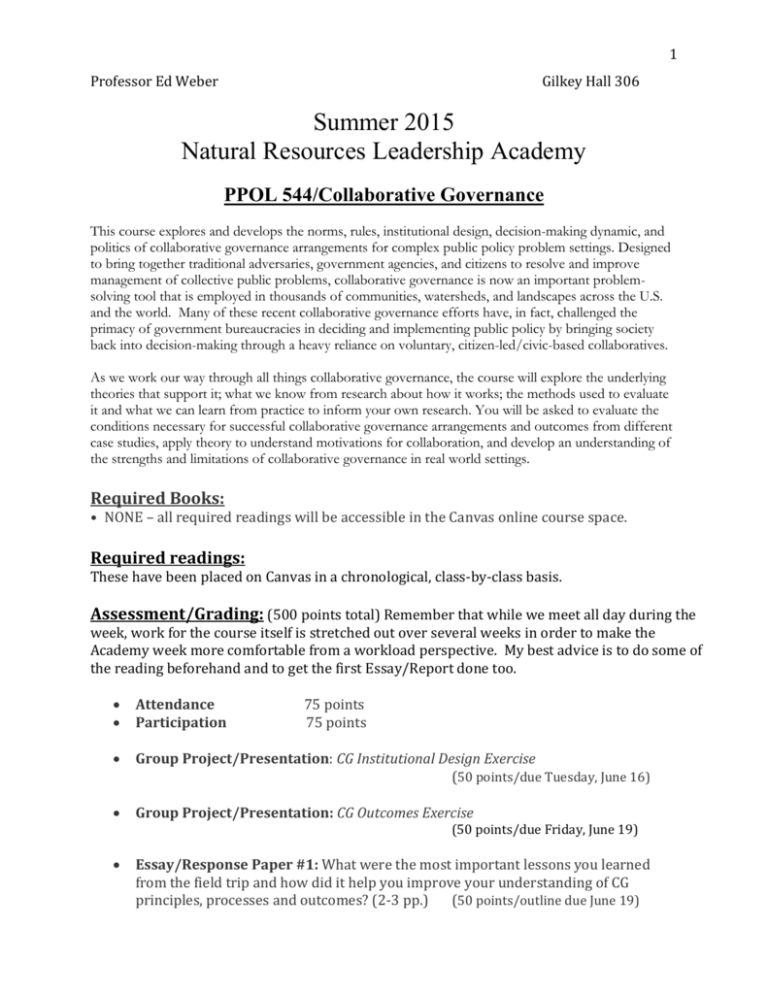
1 Professor Ed Weber Gilkey Hall 306 Summer 2015 Natural Resources Leadership Academy PPOL 544/Collaborative Governance This course explores and develops the norms, rules, institutional design, decision-making dynamic, and politics of collaborative governance arrangements for complex public policy problem settings. Designed to bring together traditional adversaries, government agencies, and citizens to resolve and improve management of collective public problems, collaborative governance is now an important problemsolving tool that is employed in thousands of communities, watersheds, and landscapes across the U.S. and the world. Many of these recent collaborative governance efforts have, in fact, challenged the primacy of government bureaucracies in deciding and implementing public policy by bringing society back into decision-making through a heavy reliance on voluntary, citizen-led/civic-based collaboratives. As we work our way through all things collaborative governance, the course will explore the underlying theories that support it; what we know from research about how it works; the methods used to evaluate it and what we can learn from practice to inform your own research. You will be asked to evaluate the conditions necessary for successful collaborative governance arrangements and outcomes from different case studies, apply theory to understand motivations for collaboration, and develop an understanding of the strengths and limitations of collaborative governance in real world settings. Required Books: • NONE – all required readings will be accessible in the Canvas online course space. Required readings: These have been placed on Canvas in a chronological, class-by-class basis. Assessment/Grading: (500 points total) Remember that while we meet all day during the week, work for the course itself is stretched out over several weeks in order to make the Academy week more comfortable from a workload perspective. My best advice is to do some of the reading beforehand and to get the first Essay/Report done too. Attendance Participation Group Project/Presentation: CG Institutional Design Exercise (50 points/due Tuesday, June 16) Group Project/Presentation: CG Outcomes Exercise Essay/Response Paper #1: What were the most important lessons you learned from the field trip and how did it help you improve your understanding of CG principles, processes and outcomes? (2-3 pp.) (50 points/outline due June 19) 75 points 75 points (50 points/due Friday, June 19) 2 o Given that this comes the day after the all day field trip, the only thing due on Friday is a “rough” outline of the paper. You can then use the in-class discussion to inform your paper further. The final paper is due on Tuesday, June 23. Essay/Response Paper #2: Given the explosion of collaborative governance institutions over the past 20 years, is the era of traditional top-down, hierarchical government over? Why or why not? (2-3 pages) (50 pts/due June 29) Essay/Response Paper #3: What are the primary strengths & weaknesses of the Collaborative Governance approach? (2- 3 pp.; list & discuss 3-4 of each) (50 pts/due July 8) Policy Paper 1: Leading a CG to Success: Value and What Else Do You Need to Know? (5 pp.) Approach CG from the perspective of a politician and/or administrator. Let’s say you’re either interested in supporting (politician) and/or have been charged with developing and administering a CG arrangement (administrator/leader). What is most valuable in these readings and what else do you need to know to be successful/effective? What tweaks/changes are needed to “translate” the academic literature into something useful for actual, real world problem solving? (100 points/due July 17) Extra Credit: What were the 3 most important things you learned in this class & what are the 3 things you wished you would have learned in this class? (20 points/due July 17) Disability & Accommodation "Accommodations are collaborative efforts between students, faculty and Disability Access Services (DAS). Students with accommodations approved through DAS are responsible for contacting the faculty member in charge of the course prior to or during the first week of the term to discuss accommodations. Students who believe they are eligible for accommodations but who have not yet obtained approval through DAS should contact DAS immediately at (541) 737-4098." Cheating/Plagiarism Policy The text below is the official OSU policy. OAR 576-015-0020 (2) Academic or Scholarly Dishonesty: a) Academic or Scholarly Dishonesty is defined as an act of deception in which a Student seeks to claim credit for the work or effort of another person, or uses unauthorized materials or fabricated information in any academic work or research, either through the Student's own efforts or the efforts of another. b) It includes: (i) CHEATING - use or attempted use of unauthorized materials, information or study aids, or an act of deceit by which a Student attempts to misrepresent mastery of academic effort or information. This includes but is not limited to unauthorized copying or collaboration on a test or assignment, using prohibited materials and texts, any misuse of an electronic device, or using any deceptive means to gain academic credit. 3 (ii) FABRICATION - falsification or invention of any information including but not limited to falsifying research, inventing or exaggerating data, or listing incorrect or fictitious references. (iii) ASSISTING - helping another commit an act of academic dishonesty. This includes but is not limited to paying or bribing someone to acquire a test or assignment, changing someone's grades or academic records, taking a test/doing an assignment for someone else by any means, including misuse of an electronic device. It is a violation of Oregon state law to create and offer to sell part or all of an educational assignment to another person (ORS 165.114). (iv) TAMPERING - altering or interfering with evaluation instruments or documents. (v) PLAGIARISM - representing the words or ideas of another person or presenting someone else's words, ideas, artistry or data as one's own, or using one's own previously submitted work. Plagiarism includes but is not limited to copying another person's work (including unpublished material) without appropriate referencing, presenting someone else's opinions and theories as one's own, or working jointly on a project and then submitting it as one's own. c) Academic Dishonesty cases are handled initially by the academic units, following the process outlined in the University's Academic Dishonesty Report Form, and will also be referred to SCCS for action under these rules. Rules for Discussion/Participation in class. It is expected that all students will treat others with respect, civility, and generosity at all times. Always assume that a colleague making a statement has come to their conclusions honestly, no matter how much you might disagree with a particular statement or conclusion. We will recognize that we all are entitled to different opinions, but that it is also fair game for anyone to ask us to defend our opinions or statements/conclusions. It is never acceptable in this class to denigrate others or to call others by offensive names. Keep the conversation and debate above board at all times. Finally, recognize that this class is a free speech zone. We need to be able to explore some very contentious, contested policy topics in order to fully grasp all the different perspectives on public policies since that is the very basis for the course. This means you likely will hear students who think differently than you utter what may appear to you as insane or otherwise disagreeable things. Keep yourself in check (i.e., discipline yourself and your responses) so that we can have civil, constructive dialogues, and remember, our primary purpose is learning. In order to do that, we have to create a safe space for discussion so that all feel free to join in/contribute. ______________________________________________ Opening Session: Monday, June 15 (8:00 to 8:30 AM) – Scott Reed, OSU Vice President, Leader of Extension Services Session #1: Monday, June 15 (8:30 AM to 9:45 AM) – Course Overview + Background on Collaborative Governance Weber. 2000. "A New Vanguard for the Environment? ..." Society and Natural Resources. Weber. 2013. [Excerpt] from Auckland Report on CG. This covers some of the benefits and compares CG to traditional top-down, experts-in-charge administration (aka “consultation” in Commonwealth countries.) See attached. 4 O’Brien, Marg. 2010. [excerpt from her NZ Ministry of Env report]. This doc covers different definitions of CG. Lecture & Class Discussion Session #2: Monday, June 15 (10:00 AM to 11:30 AM) – Wicked Problems & The Value of Practice-Based Knowledge Edward P. Weber, Jill Belsky, Denise Lach, and Antony Cheng. 2014. “The Value of PracticeBased Knowledge,” Society and Natural Resources 27 (10): 1074 – 1088. UTube Video: Steve Nixon. 2012. “Solving Wicked Problems.” (6 minutes) http://www.youtube.com/watch?v=qUH5XOPF8pc Lecture & Class Discussion Session #3: Monday, June 15 (12:30 PM to 5:00 PM) – Other Motivations for Choosing CG “Government as enabler?” Sirianni, Carmen. 2010. Investing in Democracy. Washington, D.C.: Brookings Institutions. Pp. 1 – 65. (see attached file). Pisano, G., & Verganti, R. (2008). “Which kind of collaboration is right for you,” Harvard Business Review, (December 2008), 78–87 Individualized exchanges -- (grazing)http://perc.org/articles/peaceable-solution-range-warover-grazing-rights (water) http://perc.org/articles/scott-river-water-trust-improving-stream-flows-easy-way The transaction cost savings argument. Chapter 3 only of … Weber, E. P. (1998). Pluralism by the Rules: Conflict and Cooperation in Environmental Regulation. Georgetown University Press. Session #4: Tuesday, June 16 (8:00 AM to 9:45 AM) – The Importance of Existing/Starting Conditions Ostrom, Elinor. 1990. Governing the Commons: The Evolution of Institutions for Collective Action. Cambridge University Press. Read Chapters 1 & 2 (attached). Pretty, Jules, et al. 2003. “Social Capital and the Collective Management of Resources,” Science 302: 1912 – 1915. http://www.julespretty.com/wp-content/uploads/2013/09/3.-Science-3021912-1915-Pretty.pdf Lecture & Class Discussion 5 Session #5: Tuesday, June 16 (10:00 AM to 11:30 AM) – Collaborative Futuring and Planning Weber (forthcoming). “The Third Wave: Government Led Techno-Democratic Collaboration in New Zealand.” Journal of Environmental Policy & Planning. Dietz, T. (2013). Bringing values and deliberation to science communication. Proceedings of the National Academy of Sciences of the United States of America, 110 Suppl 3, 14081–7. Lecture & Class Discussion Session #6: Tuesday, June 16 (12:30 PM to 2:45 PM) – Institutional Design and Principles for Success (Part I) (all readings for next two sessions are located here.) Ansell, Chris, & Gash, Alison. (2008). Collaborative governance in theory and practice. Journal of Public Administration Research and Theory, 18(4), 543–571. O’Brien, Marg. 2010. “Review of Collaborative Governance: Factors crucial to the internal workings of the collaborative process,” Report for the Ministry of Environment (New Zealand) (April). Ostrom, Elinor. 1990. Governing the Commons: The Evolution of Institutions for Collective Action. Cambridge University Press.38 Read pp. 88 - 102. Weber, Edward P. 2013. “Building Capacity for Collaborative Water Governance in Auckland,” Report for the Water Management Strategy and Policy Team, Auckland Council, a Regional Government in New Zealand (June). Read only pp. 9 – 19. Daniels, Steven, & Walker, Gregg. 2001. The Collaborative Learning Approach.9 Chapters 2 (pp. 15 – 24) and 4 (pp. 55 – 76) Group Presentations/Discussion: Teams will take the design principles from course readings and develop/synthesize them into their own “dressed for success” CG arrangement. Your goal is to develop an integrated, coherent institutional design and explain why yours is better and more likely to succeed than those on offer here. This will require good, solid understanding of how strengths are operationalized and critiques of the weaknesses of the models on offer in the readings, including my own. Teams will present their models in class. Session #7: Tuesday, June 16 (3:00 PM to 5:00 PM) – Institutional Design and Principles for Success (Part II) No readings. Group Presentations/Discussion (same as above – the CG Institutional Design Exercise continues) _____________________________________________ 6 Session #8: Wednesday, June 17 (8:00 AM to 9:45 AM) – CG Outcomes (Part I) Conley, A., & Moote, M. (2003). Evaluating collaborative natural resource management. Society & Natural Resources, 371–386. Process Outcome Measures. O’Brien, Marg. 2010. Last part of her CG review for the New Zealand Ministry of Environment (full cite is included under the Institutional Design week of this course). Group #1 Presents/Discussion (same as above – the CG Institutional Design Exercise continues) Session #9: Wednesday, June 17 (10:00 AM to 11:30 AM) – CG Outcomes (Part II) Rogers and Weber (2010). “Thinking Harder about Outcomes for Collaborative Governance Arrangements,” American Review of Public Administration, 40 (5) (September): 546 -56724 Weber, Edward P., Nicholas Lovrich, and Michael Gaffney. 2007. “Assessing Collaborative Capacity in a Multi-Dimensional World,” Administration & Society 39 (2) (April): 194-220. Group #2 Presents/Discussion (same as above – the CG Outcomes Exercise continues) Session #10: Wednesday, June 17 (12:30 PM to 2:45 PM) – Empirical Examples in Water & Forestry Weber, Edward P. 2014. Whychus Creek case (Deschutes River. Oregon): Shows how application of collaborative “principles” creates success. Shows how network analysis/surveys, along with other principles, are used to measure and report markers of collaborative problem solving capacity. The Collaborative All Lands Approach to Forestry (readings TBD) Lecture & Class Discussion Session #11: Wednesday, June 17 (3:00 PM to 5:00 PM) – Managing Collaborative Governance in the Real World Guest Lecture: Emily Jane Davis, OSU College of Forestry & OSU o Readings TBD Background pieces (will help w/ prep for Thursday’s Field Trip) Deschutes River Conservancy (DRC) (see attached) Deschutes River & Bend, OR (see attached) Sisters (OR) & Salmon Recovery (see attached) 7 _____________________________________________ DEPART FOR BEND, OR for Thursday Field Trip (will stay in Bend Wednesday night) _____________________________________________ Session #12: Thursday, June 18 (8:00 AM to 5:00 PM) – Central Oregon Field Trip (Deschutes River, Whychus Creek, Sisters and Bend, OR) _____________________________________________ Session #13: Friday, June 19 (8:00 AM to 9:45 AM) – Field Trip Debriefing Group Discussion focused on these questions: 1) What did we learn from the Deschutes/Sisters field trip? 2) How did these lessons enhance our understanding of Collaborative Governance arrangements? Session #14: Friday, June 19 (10:00 AM to 11:30 AM) – Limitations & Weaknesses of CG Connelly, David R., Jing Zhang, and Sue Faerman. 2008. “The Paradoxical Nature of Collaboration.” In Bingham and O'Leary. Ch. 2. pp. 17-35 Huxham, C., S. Vangen, C.Huxham, and C. Eden. 2000. The Challenge of Collaborative Governance. Public Management Review 2(2) pp. 337 – 35834 In-Class Discussion on Readings and the Question “what are the top 10 criticisms or limitations of collaborative governance?” Session #15: Friday, June 19 (12:30 PM to 2:45 PM) – The Role of Govt. in CG Re-read/skim both Weber (forthcoming). “The Third Wave” (from Session #5) and Carmen Sirianni. 2010. Investing in Democracy (from Session #3). Koontz, T. M., Steelman, T. A., Carmin, J., Korfmacher, K. S., Moseley, C., & Thomas, C. W. (2004). Collaborative Environmental Management: What Roles for Government (p. 224). Routledge40 Chapters to be Assigned. Session #16: Friday, June 19 (3:00 to 4:00 PM) – The Question of Scale & WrapUp Karkkainen, B. (2002). Collaborative ecosystem governance: Scale, complexity, and dynamism. Va. Envtl. LJ 8 In-Class Discussion: Can the issues of scale for collaborative governance be overcome? If not, why not? If so, why? Thinking back on other course readings, are these challenges any different for CG than other forms of governance? And if “large scale” doesn't work with collaborative governance, then what else would work better and why/how? _____________________________________________ Closing Session: Friday, June 19 (4:00 PM to 5:00 PM) – Panel Discussion w/ All NRLA Classes (location TBA)


